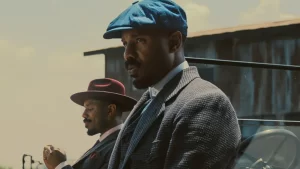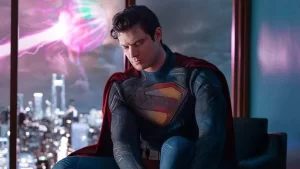Yet, Another Wes Anderson Film
[Continuing our 2015 Academy Award Roundup]
A Film Review of The Grand Budapest Hotel
Hollywood is rife with reboots, remakes, adaptations and re-imaginations and despite some of these projects still making enough profit across the board to continue justifying that business model, audiences have all but fully accepted that originality in La La Land is dead. This lack of originality cannot be said of Wes Anderson and his movies as this particular writer/director has effectively invented his own sub-genre of filmmaking that I would best describe as folk-comedy. Of course, one only needs to watch but one Wes Anderson film to understand his style and eccentricity because it is carbon copied without fail in all of his pictures. There isn’t a lot of action, there is plenty of narration, and there are whimsical selections of background music as well as a number of select Hollywood A-Listers that are apparently at Anderson’s beck and call whenever he’s written a new film. Wes Anderson has made a career at crafting his own films, telling his own stories and essentially answers to no one and that’s the kind of autonomy most filmmakers in Hollywood secretly covet, yet are unwilling to make the compromises required to attain it. The Grand Budapest Hotel is a Hollywood-ish production with the heart of an Indie, but viewers beware: Wes Anderson films are acquired tastes so if your idea of comedy is Will Ferrell, please look elsewhere.
The story of The Grand Budapest follows the exploits of Gustave H, the charming, womanizing concierge of the hotel whose dedication to his post would rival a clergyman’s. He mentors and befriends the hotel’s lobby boy, Zero and the two proceed to get entangled in a murder mystery (of sorts) of an insanely wealthy and elderly woman whom Gustave was involved with sexually. Mind you, this whole story is also being told as a flashback from the perspective of an elderly Zero who happens to be the current owner of the hotel in what is established as the present time of the film. What starts off as a fairly mundane drama morphs into an absurd “whodunit” featuring some improbable twists of fate to further heighten the ridiculous series of events that appears to set Gustave up as the primary culprit. This screen story isn’t some overdressed metaphor regarding today’s society nor is it some ambiguous commentary regarding the past. There is no hidden agenda. It is a simple, somewhat hilarious adventure that is about friendship and the special extended family that is the circle of premium hotels and their staffs. This is a film that ultimately relies on telling the story to the audience through narration and dialogue as opposed to showing with action. Prepare yourselves for this fact in addition to the eccentric formality of its delivery, further enhancing the overall absurdity which is never acknowledged by the film’s characters.
The Grand Budapest Hotel is not a film one could easily argue for as being “seminal” and if that is the case, one could also easily ask why this film is even in the final 8. What I said in my review of Boyhood regarding this year’s Indie love applies to this film as well. Big studio losses yield smaller films’ gain and although Wes Anderson films retain the spirit of true independence, there are a number of factors that clearly elevate their status to established studio productions. A $30 million dollar budget, distribution through Fox Searchlight and a cast that includes Ray Fiennes, Adrien Brody, Willem Dafoe, Jeff Goldblum, Harvey Keitel, Jude Law, Bill Murray, Ed Norton, Tilda Swinton, Tom Wilkinson and even Owen Wilson – well, let’s just say that any Indie film would kill to have any one of these individuals, budget or distribution as part of its production. Beyond these factors, The Grand Budapest Hotel belongs with the other nominees thanks to exceptional set design, cinematography, performances and ability to entertain. Even if the scope of the film in question doesn’t have monumental questions about life to challenge, it doesn’t mean that simpler ideas cannot have an equally moving effect on the audience.
I mentioned earlier how the audience is in on the absurdity of this series of unfortunate events despite the ignorance of all its characters. That’s where Wes Anderson’s sense of comedy originates, but the fact that his cast plays these events as seriously as a WW II drama (or thereabouts) is what allows the sophisticated banter throughout to not be misconstrued as a dainty passing of mere poop jokes. Fully engaged and interested performances are had by all (including the previously mentioned A-Listers) which is essential to a Wes Anderson film. Without this level of dedication, his movies become sub-pedestrian. Unfortunately, the volume of big names afford little opportunity for most of them to shine within this narrative as Gustave and Zero hog most of the screen time.
Tony Revolori generates a fine performance as the eager to learn and underappreciated lobby boy, Zero. The audience certainly is introduced to the world of The Grand Budapest through his eyes as we learn what being a true professional in the hotel business is all about, along with some helpful tips to navigate some of the other tumultuous waters in life. His character certainly starts off being very sheepish in relation to Gustave, but his character grows and the audience can appreciate his evolution into that of a peer. The key to Revolori’s performance is maintaining a certain level of innocence about Zero, despite his experiences and moments of self incrimination. After all, a lobby boy must know and learn at the same time so innocence in the face of intimidation is something we can all identify with.
This film, however, is all about Ray Fiennes and his quest for Oscar vindication. Well, perhaps that’s being a tad overzealous because if Voldemort wanted such praise, he would command it via the cruciatus curse. Seriously though, Fiennes approaches the role of Gustave with the same level of professionalism he applied at the Royal National Theatre. Although this character isn’t nearly as appalling as a Nazi War criminal or as intriguing as a Count desiring to be euthanized (both roles he was nominated for in Schindler’s List and The English Patient respectively), Gustave allows Fiennes an opportunity to fully engage his own, personal charm. Gustave’s arrogance isn’t too domineering, his attention to detail isn’t too obsessive and his appetite for wealthy hags isn’t too disgusting. They are all just enough before crossing the line into the realm of the anti-hero with the help of one other area of motivation: his religious care and dedication for the hotel establishment in his charge. Love for one’s job or profession engenders dignity and exemplary self-worth and this elevated demeanor is masterfully maintained throughout by Fiennes and it generates a healthy amount of charisma about him. Gustave may have invited the negative attention he receives for sticking his nose where it doesn’t belong, but the audience cannot help but sympathize for him because he really doesn’t deserve it.
Every scene in a Wes Anderson film is like a rectangle of framed art with live motion within. Characters are constantly looking through the screen and at its audience. Close ups are very intimate. These scenes leave the infusion of meaning and beauty entirely in the eyes of the viewer. This is the style of The Grand Budapest Hotel and although this film is entertaining enough featuring some excellent performances, I don’t expect this film to be a serious contender on Oscar night. Ray Fiennes certainly has better odds at winning that elusive Oscar gold, but with very serious competition in the best leading male category from the likes of Bradley Cooper and Benedict Cumberbatch, it’s far too difficult to predict.







